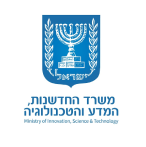Science Accelerator
The Program
The Ministry of Science (Ministry of Innovation, Science and Technology) provides support and funding in their mission of knowledge transfer from academia to industry.
In order to streamline the process, the ministry has allocated funds to discover early-stage research, promoting projects and encouraging entrepreneurship among academic researchers as part of the national goal.
We are proud to open 2024’s “Science Accelerator Program.”


Our 2024 submission period is now open.
How it works

These days, Israeli society is facing challenging circumstances that impact various aspects of individuals’ lives and the community as a whole. Now more than ever, we are called upon to demonstrate national resilience, which is exemplified, among other ways, by strengthening research and innovation in Israeli academia and industry.
In this current round, we invite you to submit proposals in the following areas:
– Effective strategies for coping with emergency situations
– Ensuring food security
– Promoting support for Israeli agriculture
– Strengthening the Israeli industry
– Enhancing community and individual health.
Funding, Application Process, Program Terms
- The total budget for a single project will not exceed NIS200,000 for a period of 12 months
- The Program will support early-stage research projects with the potential for commercialization
- Collaboration between young researchers and/or research groups from various disciplines in the fields (an advantage)

Application Process
Click here to apply. The deadline for submission is February 25, 2024 (the submission form must include the research plan with milestones, main tasks and details of the required budget items). |
Step 1:
Click here to download and fill out the proposal template
Step 2:
Click here to submit your completed form
The Yissum team is happy to consult and advise with the application process. Please email for further assistance: [email protected]l
Frequently Asked Questions
A safe harbor agreement allows the researcher to consult with another entity without Yissum or HUJI’s involvement. All terms are to be negotiated between the researcher and the company. The Safe Harbor applies when none of the university’s resources are being used and the research in question is not based on an invention made at the university and is not an extension of the researcher’s past, current or future research at the university. Once signed by you and the department head please send it to Yissum’s General Counsel,
[email protected]. He will send you a release letter. Note that you will need to issue invoices to the company.
An “Implied Know-How License” is an agreement we use when the researcher acts as a consultant to a company and the company receives ownership of all the new intellectual property (patents and know-how) developed by the researcher in the course of such consultancy.
This agreement is used when the researcher acquired the know-how at the university. In this arrangement, in addition to the researcher’s consulting fees, Yissum/Huji/reseracher gets compensated (usually via an annual fee) on the know-how that is assigned to the company via a license.
An “Implied Know-How License” is an agreement we use when the researcher acts as a consultant to a company and the company receives ownership of all the new intellectual property (patents and know-how) developed by the researcher in the course of such consultancy.
This agreement is used when the researcher acquired the know-how at the university. In this arrangement, in addition to the researcher’s consulting fees, Yissum/Huji/reseracher gets compensated (usually via an annual fee) on the know-how that is assigned to the company via a license.
An “Implied Know-How License” is an agreement we use when the researcher acts as a consultant to a company and the company receives ownership of all the new intellectual property (patents and know-how) developed by the researcher in the course of such consultancy.
This agreement is used when the researcher acquired the know-how at the university. In this arrangement, in addition to the researcher’s consulting fees, Yissum/Huji/reseracher gets compensated (usually via an annual fee) on the know-how that is assigned to the company via a license.
An “Implied Know-How License” is an agreement we use when the researcher acts as a consultant to a company and the company receives ownership of all the new intellectual property (patents and know-how) developed by the researcher in the course of such consultancy.
This agreement is used when the researcher acquired the know-how at the university. In this arrangement, in addition to the researcher’s consulting fees, Yissum/Huji/reseracher gets compensated (usually via an annual fee) on the know-how that is assigned to the company via a license.